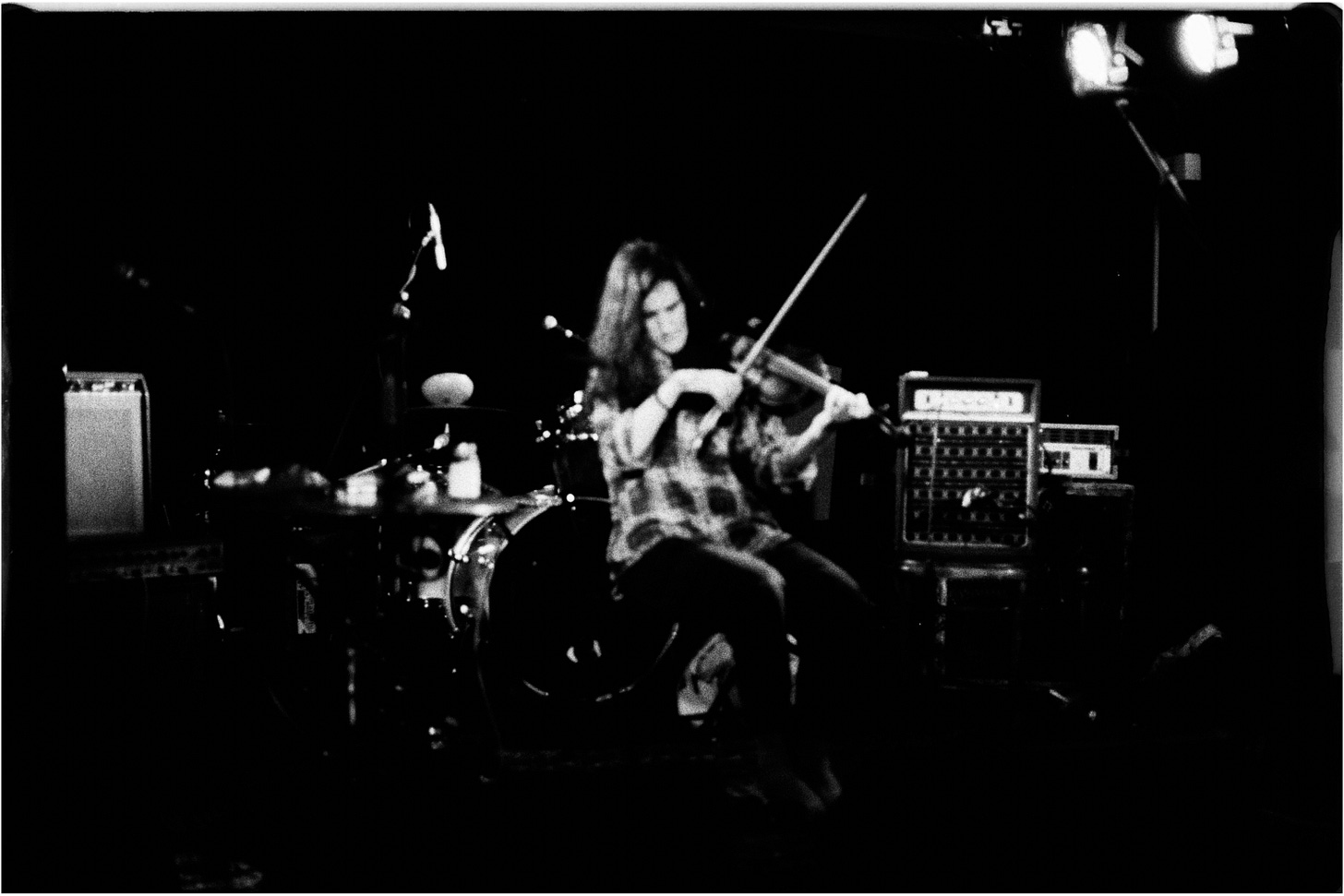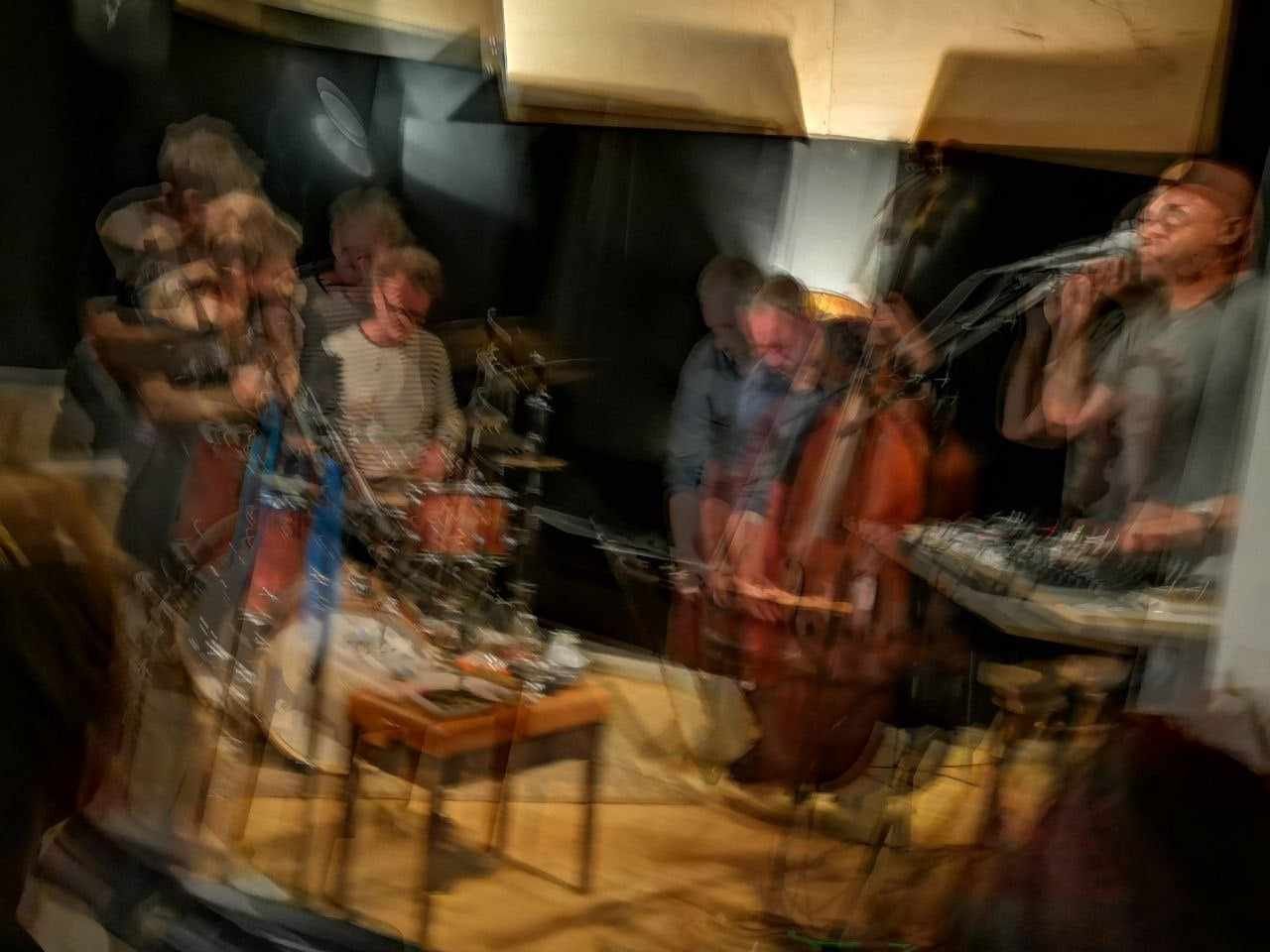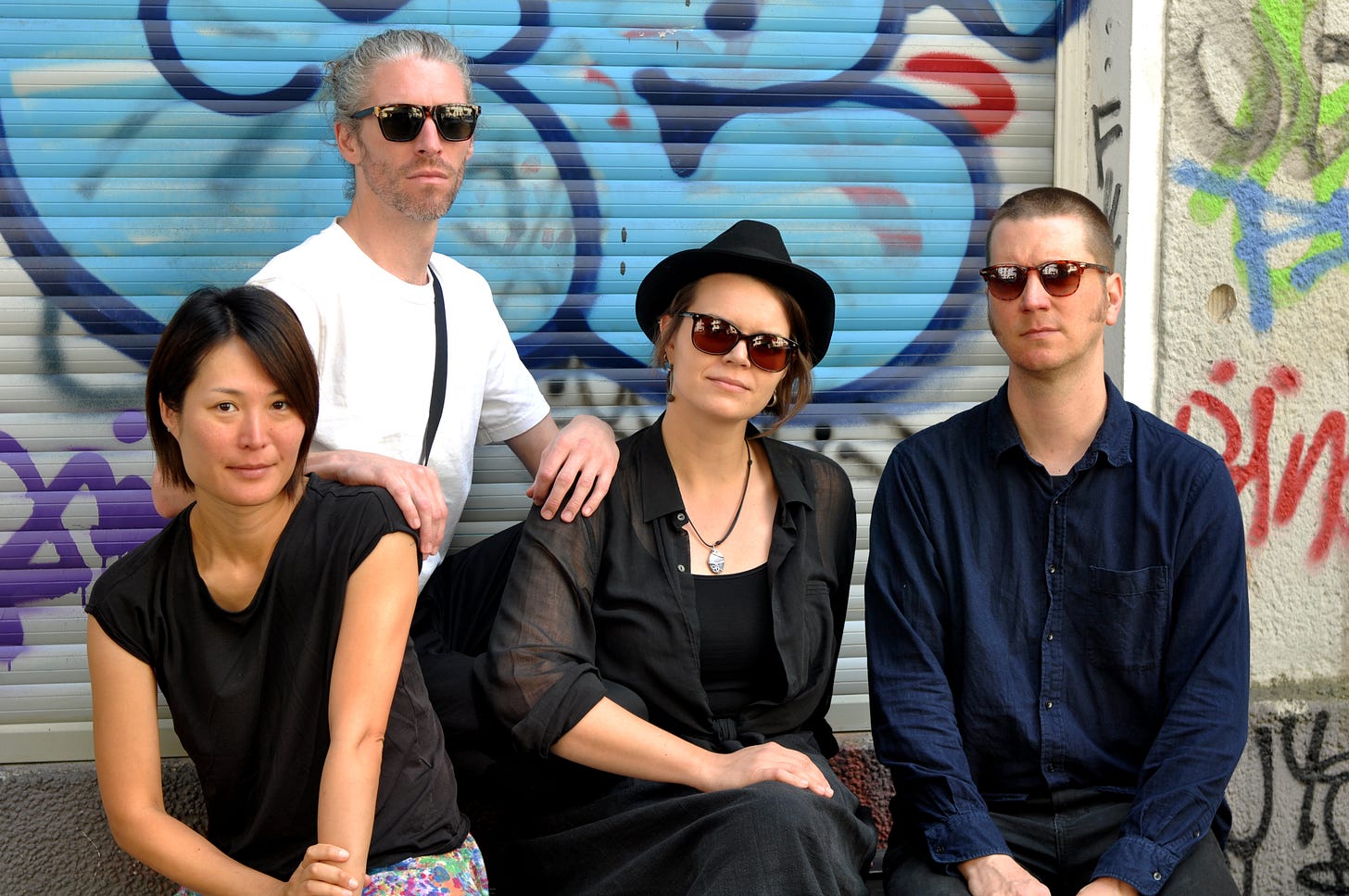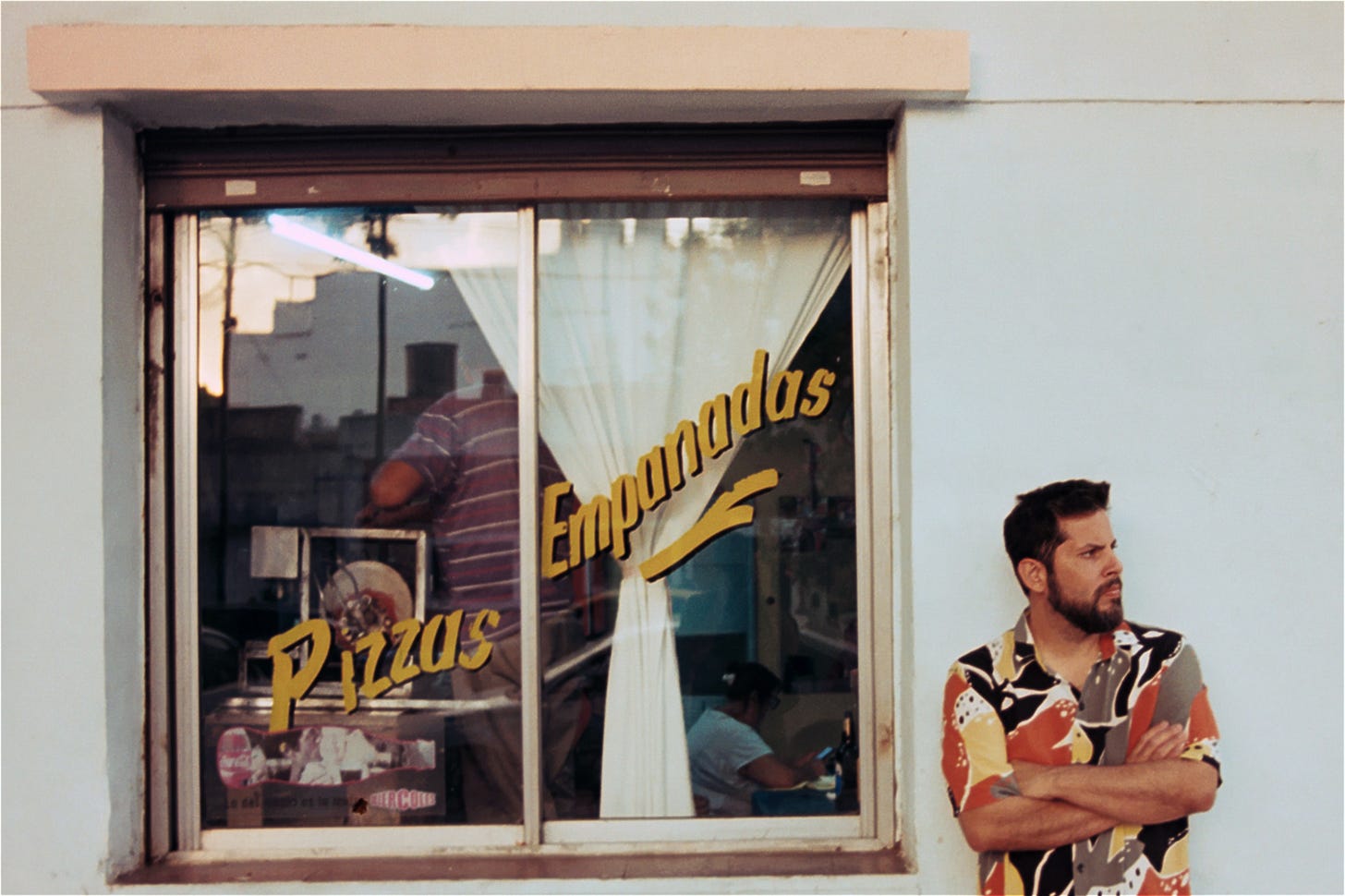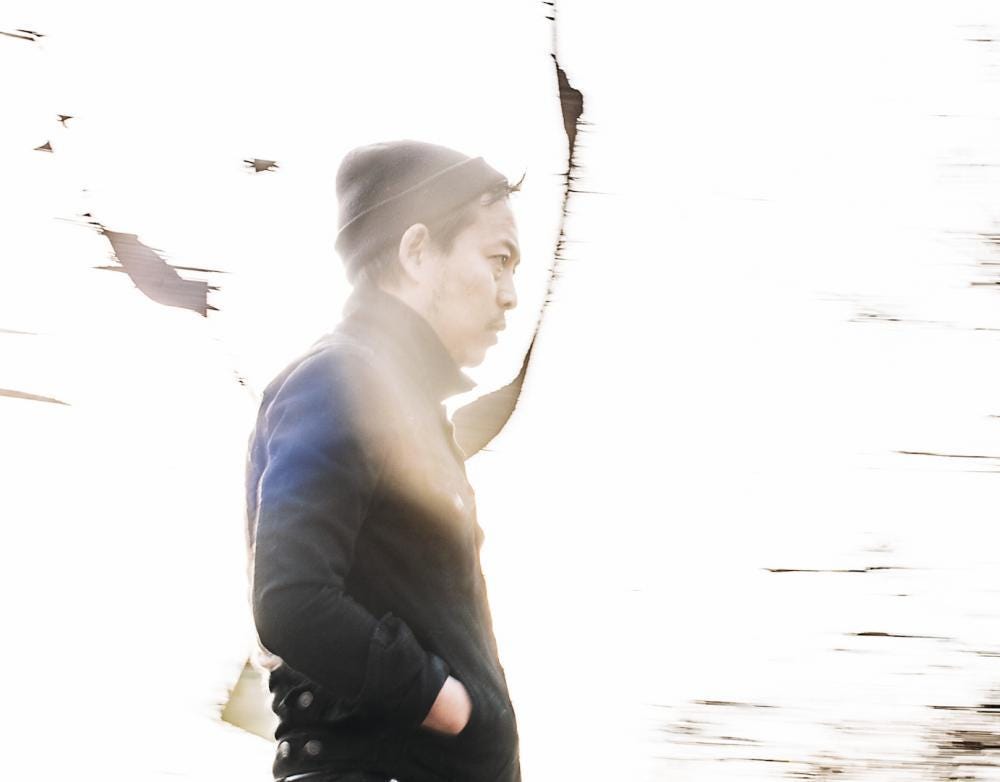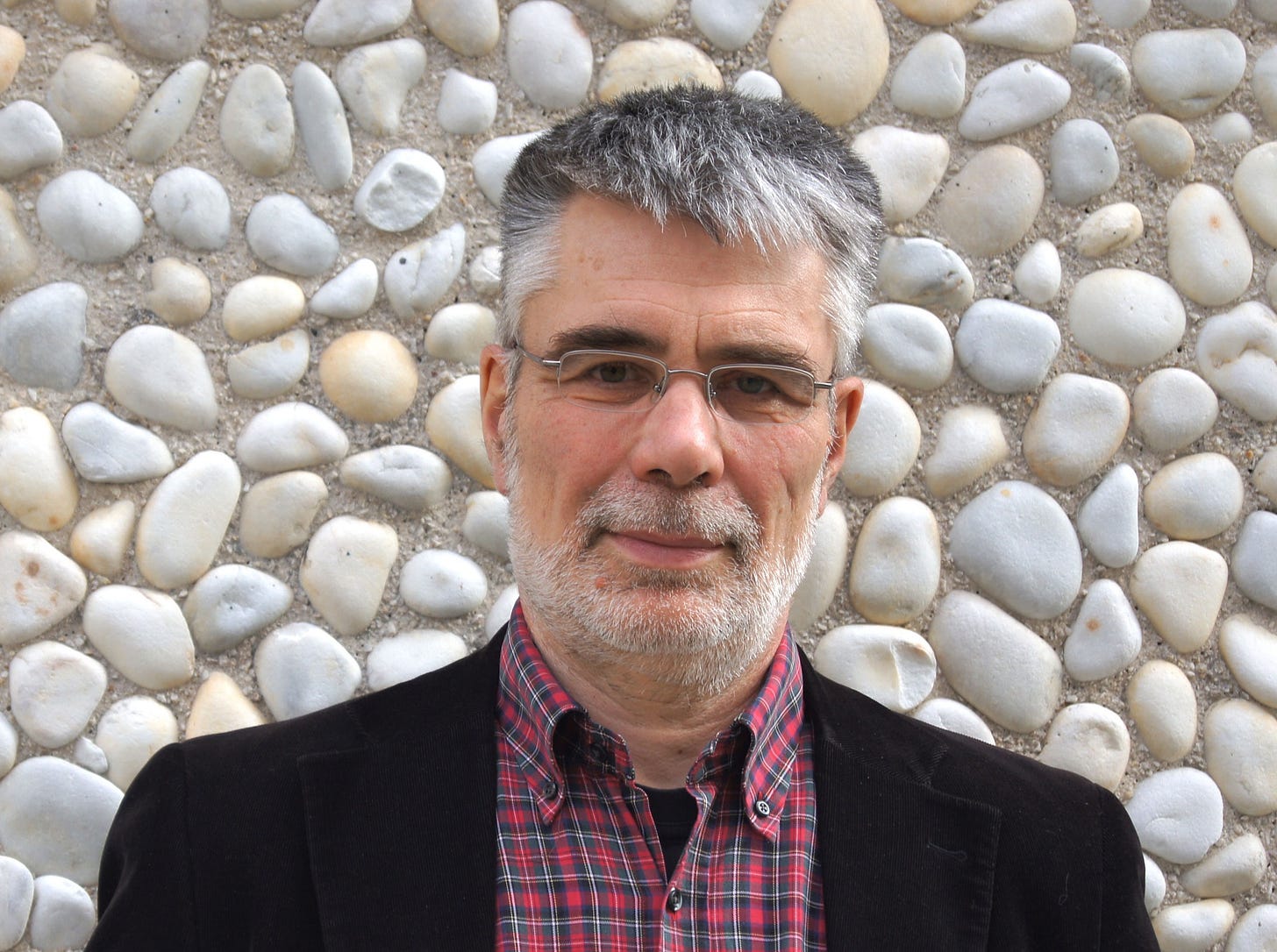Grainy With a Side of Brainy
Ailbhe Nic Oireachtaigh, Peepholes, Brad Henkel Quartet, Jorge Espinal, Tashi Dorji, Ralf Hoyer
Hello, dear readers. As is often the case I wrote too much to fit in the weekly email, so for those who want to see the full list of recommended Berlin shows this week, click the banner and you’ll be taken to the web-based version of the newsletter.
Ailbhe Nic Oireachtaigh Gets Bolder
Since I noticed that Irish violist Ailbhe Nic Oireachtaigh was giving a solo performance at Richten25 on Tuesday, October 14 I’ve experienced a swell of delight through digging into her music. Her name sticks in one’s memory, even if only visually, and I’ve yet to try saying it aloud. A story in the Wire from a couple of years ago helpfully includes a pronunciation guide: “Alva Nic Eer-ock-thig.” I mentioned her earlier this year when I wrote about the latest album by the Scottish folksinger Quinie, but in researching her work I was astonished by its range. I actually had quite a few recordings featuring her by the likes of Cian Nugent, Circuit des Yeux, Alasdair Roberts, Aoife Nessa Frances, and Aongus McEvoy. She also plays on a premiere recording of Éliane Radigue’s Asymptote Versatile, one of the composer’s earliest works from 1963-64, that was assembled by Welsh harpist Rhodri Davies with the composer’s blessing—it comes out on Friday.
Oireachtaigh’s sensibility braids traditional folk and improvised music, but her curiosity seems to push and warp all sorts of practices and aesthetics. The heart of her work revolves around the rigorous solo viola practice heard on solo albums The Rounds (Krut), Oreing (Fort Evil Fruit), and Live at Sonic Acts (Scatter Archive), where her manipulation of grainy gut strings hit hard, their slashing heft, harmonic depth, and melodic gestures, often spiked and altered with feedback, unfold patiently and sure-footedly. Check out “Hawler,” below, for a glimpse into this particular facet of her work, but don’t make the mistake of assuming you fully get what she’s doing. In Oireachtaigh’s hands the line between folk and minimalism is slender if not wholly irrelevant, and she seems intent on endlessly building and developing her abundant skills and ideas rather than resting comfortably upon them. Maybe she’ll collate all of those abilities into a single approach one day, but right now Oireachtaigh seems happy to bounce between disparate techniques, concepts, and styles, all of them adapted and energetically applied to a deliciously malleable framework.
Earlier this year she released Lux Gratis (Kraak), a recording that seriously flips the Oireachtaigh script. Several tracks feature overdubbed winds by fellow Irish musician Sam Comerford, but Oireachtaigh herself adds guitar, keyboard, church organ, electronics, bowls, fork, and sticks to her arsenal. In her album note she explains the project began with a field recording she made of the BAE Systems shipyard—a facility owned by one Europe’s largest arms manufacturer. As she writes:
For over a year this consistent metallic banging noise would echo around the park for hours a day. It turned out to be the construction noise for the foundations of a massive new shipbuilding hall, a multi-million pound investment to boost the efficiency of the thriving arms industry. I have been using this recording in live sets over the last year and wanted to carry the idea through to these recordings. It caused me to think differently about environmental sound and how we choose to acknowledge or not the meaning of certain sounds we live with, how there is much information in each sound we hear.
The project also seems to have changed the way she makes music herself, because these harrowing multi-tracked pieces, where the viola groans like an industrial machine as much or more than a string instrument, arrive as a transmission from an alien world. She developed the music during a Q-02 artist residency in Brussels during February of 2024, where the notion of breath and space imbued her work—a fact which partly explains the presence of the wind instruments, but Oireachtaigh isn’t tethered to representational sound. In fact, if I hadn’t read the background info I would have probably never made such connections. The work is much different from the solo viola material, but the same feverish, inquisitive process is at play. Below you can check out the gorgeously expansive “Long tones for a big room,” which comes closest to the solo viola work. Tuesday’s set is her first solo performance in Berlin and in an email she explained that “ the current set is a mix of things, attempting to meld some source material from Lux Gratis with new viola ideas.” Sounds good to me. The bill is rounded out by a quartet performance from violist Ernesto Rodrigues, guitarist Andreas Willers, cellist Guilherme Rodrigues, and tenor saxophonist Jung-Jae Kim.
Trouble in the East Records Turns Ten
Last week I picked up a catalog published by the Berlin record label Trouble in the East. I was shocked by how thick it was, a 100-page document chronicling the imprint’s decade-long history, which includes 47 releases since 2015. The label is quietly and efficiently run by trombonist/tubist Gerhard Gschlößl, a key figure on the local scene as much for his infrastructure support as much as diligent role as a sideman. Once in a while he even leads a project! The label is celebrating its 10th anniversary, shining a light on itself at the annual Jazz & Experimental in Berlin fest at the Panda Platforma—it began last week and continues on Friday and Saturday, October 17 and 18. Perhaps no single label captures such a broad swath of the Berlin jazz and improvised music community as Trouble in the East, a nonchalant range vibrantly on display this weekend.
Peepholes
All three sets on Friday are by musicians with new Trouble in East releases, although a solo bass recording by Antti Virtaranta has been delayed a few weeks. I’ve been having a blast listening to Temporal Relief Keeper, the debut album from the free improvising quartet Peepholes. Usually I wouldn’t describe engagement with an improv recording as a blast, but Peepholes aren’t you typical improvising group. Dadaistic and theatrical, vocalist Mat Pogo is certainly the group’s focal point, his piled-up rants, twisted narratives, and absurdist glossolalia spewing from his mouth with such prolificacy that there should be a bucket on the table in front of them to catch all of the syllabic detritus. His bandmates—trumpeter Liz Allbee, double bassist Antonio Borghini, and drummer Steve Heather—masterfully frame his jabber, recasting his madman harangues as rhythmic motor and/or textural fly in the ointment, as the case may be. I only seem to pick up passing phrases from Pogo, but even parsing a line here or there doesn’t make much difference. Instead, it’s all about his unrelenting chatter, spreading out certain phonemes—sometimes with ridiculously wonderful Autotune effects—and repeating other phrases like a DJ riding a breakbeat.
Although Allbee is one of Berlin’s finest exponents of so-called echtzeitmusik—a scene not often celebrated for its humor—her comic timing is no less sharp than Pogo, which makes them a very special and unexpected frontline. Sometimes Allbee adroitly picks up rhythms or tangled phrases by Pogo, translating his vocalic emanations as warped brass lines, but most of the time she’s charting her own path alongside his, toggling between trumpet, slide whistle, harmonica, and various extended techniques, such as using the innards of an accordion as a kind of interface for blowing through the trumpet’s metal tubes. What further distinguishes Peepholes is the fact that Borghini and Heather like to groove, so no matter how abstract and cracked Pogo and Allbee may get, the rhythm team deftly creates motion, accelerating and decelerating in ever-shifting proportions. Yet just as powerful as their ability to drive the proceedings is, they also have an innate sense of when to pull back and let a different kind of mayhem ensue. As you can hear below, “Unbinding Stiff Upper Spittle”—its onomatopoetic title accurately suggestions the sort of jacked ASMR spray erupting from Pogo’s maw—delivers a giddy ebb-and-flow, a rollercoaster ride through a hall of shattered mirrors. The music covers lots of bases, but Peepholes set themselves apart by having a palpable good time when they perform. It can be infectious.
Brad Henkel Quartet
I’ve written previously in the space about trumpeter Brad Henkel, a musician that casually straddles post-bop and the extended language popularized by Axel Dörner—who also plays “jazz,” ignoring any artificial divide between disparate improvisational practices. On Overstory, Henkel’s brand-new quartet album for the label, he’s joined by pianist Rieko Okuda, bassist Isabel Rößler, and drummer Samuel Hall who collectively reveal impressive versatility throughout tunes that frequently shift direction. The album’s title track opens the album with an extended exploration of texture and gesture, with Henkel blowing unpitched breaths, puckered whinnies, and brittle melodic shards over tip-toe piano skitter, weirdly nasal arco bass splashes, and delicate cymbal patter before the elements align to produce a haunting, almost ghostly amble with a melody and harmonic drift that sounds like surprisingly Nordic. But then the trumpeter leans in and opens up, blowing away any sense of gauzy reticence.
Most of the album resides in sleek, expansive post-bop terrain, such as the slow build of “Thirteen,” where the rhythm section constructs a lengthy, steeplechase form that eventually welcomes in an extended, probing trumpet solo, only to recalibrate in midstream with a different feel as Okuda pulls back with shadowy outlines rather than the forceful chords she opened with. “Hive” has an appropriately buzzing energy, a kind of meditation that levitates more than surging forward despite a roiling intensity, while on the modal “Pfauensessel” the rhythm section forges an imperturbably groovy platform for an astonishing solo from Henkel that reduces the music to its most naked and essential core, which is followed by a superb, steadily intensifying dialogue between Okuda and Hall. Check it below. The quartet doesn’t get caught up in pyrotechnics or cold radicalism. Instead, it’s devoted to an ensemble ethic, working with familiar materials, together, to create something all its own at any given moment.
Jorge Espinal’s Sonic Daisy Chain
Over the last couple of weeks I’ve been happily perplexed by Bombos y Cencerros (Buh), the debut solo album by Jorge Espinal, a Buenos Aires-based Peruvian polymath guitarist. It’s one of the most unusual, head-scratching things I’ve heard all year, and it keeps pulling me back in. The music is all improvised by Espinal who juggles electric guitar, kick drum, cowbells, laptop and various pedals, spontaneously triggering a bank of samples and deploying electronics to freeze, vibrate, and collapse various sonic inputs. Normally such fussiness turns me off and I could see being distracted by a live performance, where there can be endless knob twirling, fader riding, and pedal hopping. At the same time he emphasizes how embodied the physical process is, and I have no doubt about the level of dexterity a performance demands. The album’s chock-a-block with some of the most herky-jerk jams I’ve ever heard, an unceasing splatter of broken grooves, brittle riffs, twitching beats, and psychedelic tonal spasms.
There’s something about Espinal that evokes Brandon Seabrook’s playing. Although Seabrook doesn’t dabble in computer stuff, the impatient, busy, and jagged quality of his solo work kind of rhymes with the Peruvian’s busted-electro aesthetic. While I don’t doubt that Espinal creates these pieces spontaneously, the outlay of time and discipline that went into forging this hyperactive approach can’t be overlooked. He knows what the fuck he’s doing even if sometimes it sounds like a kid sliding down a flight of stairs while using a sampler as an ass cushion. The guitar tone is metallic, like a bunch of plucked, amplified coils pulled to their breaking point. In other ways Espinal reminds me of the virtuosic pedal-dancing solo practice developed by Norwegian guitarist Stian Westerhus, but here the focus is almost exclusively on rhythm rather than timbre. In fact, many of the rhythms are based on traditional Latin American forms, further enhancing the syncopated mayhem of it all. Below you can check out the album’s wild closing piece “Adobo & Soplete.” He plays a solo set on Wednesday, October 15 as part of this month’s Expermentik program, sharing the bill with Andrea Neumann and Mathieu Sylvestre.
Tashi Dorji’s Guitar Brutalism
Whereas Espinal handles his guitar like a percussive appendage, Tashi Dorji wields his like a blunt force object. He’s not subtle and the live performances I’ve seen have never been particularly measured in terms of attack. And the sheer force and intensity he brings to the stage can distract from how sharp his playing can be. I’ve been digging a bracing 2024 duo album he made with saxophonist Dave Rempis called Gnash (Aerophonic)—in fact, the first time I ever heard Dorji live it was with Kuzu, a trio with the reedist and drummer Tyler Damon.
The guitarist carves out jagged, craggy patterns of abraded guitar overdrive, monolithic slabs that provide Rempis with a muscular armature to blow over. It’s loud, physical, and bruising, but the way he’s constantly chipping away at the wall of sound or tying fresh knots provides something beyond sheer might. There are moments during the epic “Orphic Hymn” where Dorji almost sounds like he’s playing a repeating lick on a Hammond B-3 organ, its Leslie speaker totally blown out. On the other hand, some of Dorji’s more stripped-down passages give Rempis a more skeletal framework, affording much different, almost tender expressions and flashes of, dare I say, delicate give-and-take. Below you can check out the album’s opening track “Forms.”
Last year Dorji also released We Will be Wherever the Fires Are Lit (Drag City), an acoustic guitar album fueled by the same jacked-up energy. Dorji still flails at his instrument with a similar heavy-handedness, focusing on riff- or pattern-oriented excursions, always riding some kind of propulsion. Yet if one looks beyond the furious momentum of the title piece, below, and there are all kinds of evolving digressions, asides, and motific elaboration, much of it elevated by the furious discharge of energy. Whether acoustic or electric, he pushes overtones to the max, encircling every note with grimy aftereffects. He also makes his acoustic guitar rattle, as if he’s got bottlecaps or other devices attached a la the buzzing kalimbas of West Africa. Dorji is in town this week and on Tuesday, October 14 he’ll perform at KM28, playing a solo set and a trio with Tony Buck on drums and Jamey Stewart (of Xiu Xiu) on guitar and electronics.
Short Take
I don’t think a day passes where I don’t observe additional holes in my knowledge, which is one of the things that keeps me going. There’s always more to discover. If I had ever heard work by German electro-acoustic composer Ralf Hoyer I have no memory of it, but I noticed that there’s an event at Schloss Biesdorf on October 17 celebrating the release of a new album on the estimable experimental imprint Edition Telemark, an association that grabbed my attention. The program will celebrate Hoyer’s 75th birthday with a diffusion of the new release, zur Mitte / hindurch / hinauf, as well as the performance of a new composition featuring trumpeter Damir Bačikin called Loop the Loop.
I tried to bone up on Hoyer’s work yesterday, hastily checking out residual_risk (Neos), an impressive 2021 album collecting a decade’s worth of work. I’m a novice when it comes to contemporary electro-acoustic work, and I admittedly lack tools for breaking this stuff down, so it all comes down to my ears. I can’t hide my skepticism for a new work that seeks the mirror the emotional states of Dante’s Divine Comedy, but if I simply ignore the literary reference I’ve enjoyed the soundworld Hoyer carves out, deftly melding his disparate materials of field recordings, live feedback, and electronics into a narrative shape that succeeds on its own terms. The label’s catalog isn’t on any streaming service or Bandcamp, but you can hear three excerpts from the album on Edition Telemark’s page for the release.
Recommended Shows in Berlin This Week
October 14: Ailbhe Nic Oireachtaigh, viola; Ernesto Rodrigues, viola, Andreas Willers, guitar, Guilherme Rodrigues, cello, andJung-Jae Kim, tenor saxophone, 8 PM, Richten25, Gerichtstraße 25, 13347 Berlin
October 14: Tashi Dorji, guitar; Tashi Dorji guitar, Tony Buck, drums, and Jamey Stewart, guitar, electronics, 8:30 PM, KM28, Karl Marx Straße 28, 12043 Berlin
October 14: Eyolf Dale Trio (Eyolf Dale, piano, Per Zanussi, double bass, and Audun Kleive, drums), 8:30 PM, Jazz Club A-Trane, Bleibtreustraße 1, 10625 Berlin
October 14: Giant Sand; Xica, 8 PM, Lido, Cuvrystraße 7, 10997 Berlin
October 15: Black Country, New Road; Westside Cowboy, 8 PM, Astra Kulturhaus Berlin, Revaler Str. 99, 10245 Berlin
October 15: Andrea Neumann, inside piano, mixer; Jorge Espinal, prepared guitar, bass drum, cowbell, pedals, laptop; Mathieu Sylvestre, electronics and tape, 8:30 PM, Experimentik, Theater im Kino, Rigaerstr.77, 10247 Berlin
October 17: Ralf Hoyer presents his works Loop the Loop and zur Mitte / hindurch / hinauf (Damir Bačikin, trumpet, and, Ralf Hoyer, sound engineering), 7 PM, Schloss Biesdorf, Alt-Biesdorf 55, 12683 Berlin
October 17: Peepholes (Liz Allbee, trumpet, electronics, Mat Pogo, voice, Antonio Borghini, double bass, and Steve Heather, drums); Antti Virtaranta, double bass; Brad Henkel Quartet (Brad Henkel, trumpet, Rieko Okuda, piano,Isabel Rössler, doublee bass, and Samuel Hall, drums), 8:30 PM, Panda Theater, Knaackstraße 97, (i.d. Kulturbrauerei, Gebäude 8) 10435, Berlin
October 17: Kaiser Pommes (Kasper Tranberg, trumpet, Asger Nissen, alto saxophone, Thorbjørn Stefansson, double bass, and Oli Steidle, drums), 8:30 PM, Sowieso, Weisestraße 24, 12049 Berlin
October 18: Jason Palmer Quartet (Jason Palmer, trumpet, Mark Turner, tenor saxophone, Michael Janisch, double bass, and Ziv Ravitz, drums), 6:30 PM, Zig-Zag Jazz Club, Hauptstraße 89, 12159 Berlin
October 18: LAX (Henrik Walsdorff, saxophone, John Schröder, piano, Gerold Genßler, double bass, and Uli Jenneßen, drums), 8 PM, Alter Schwede, Schwedenstraße 11A, 13357 Berlin
October 18: Dead Leaf Butterfly (Lina Allemano, trumpet, Els Vandeweyer, vibraphone, Maike Hilbig, double bass, and Lucia Martinez, drums); Dan Peter Sundland, electric bass; Sunk Pöschl, drums, Axel Dörner, trumpet, and Emilio Gordoa, vibraphone), 8:30 PM, Panda Theater, Knaackstraße 97, (i.d. Kulturbrauerei, Gebäude 8) 10435, Berlin
October 18: Tobias Delius, tenor saxophone, clarinet, Marta Warelis, piano, and Devin Gray, drums, 8:30 PM, Sowieso, Weisestraße 24, 12049 Berlin
October 19: Orchestre Tout Puissant Marcel Duchamp; Kulku, 7:30 PM, Neue Zukunft, Alt-Stralau 68, 10245 Berlin


